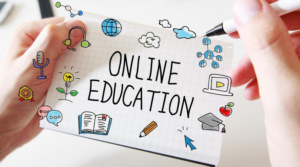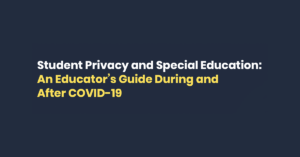Future of Privacy Forum, National Center on Learning Disabilities Release New Student Privacy and Virtual Learning Guide
The Future of Privacy Forum (FPF) and the National Center for Learning Disabilities (NCLD) today released a new resource designed to help educators navigate the unique student privacy challenges raised by COVID-19 and the shift to virtual learning, particularly for students with disabilities. Student Privacy and Special Education: An Educator’s Guide During and After COVID-19 is available for download and use at this link.
“As educators teach virtually even more, there will be many barriers to instructing every student, but concerns about data privacy shouldn’t be one,” said Lindsay Jones, President and CEO of the National Center for Learning Disabilities. “It’s important for educators to have clear information about how privacy laws impact the delivery of virtual instruction, because now more than ever we must use ed tech in a way that helps us effectively teaching all students in a virtual world.”
As part of their reopening plans, many schools are also collecting new levels of sensitive health information from staff, students, and their families, through self-reported surveys and or screenings such as temperature checks, to assess and mitigate health risks. Students with disabilities or special health care considerations that may be more vulnerable to COVID-19 may be at risk of discrimination based on their health or disability status.
“Reopening plans must balance protecting health and protecting student privacy and educational rights,” said Amelia Vance, FPF’s Director of Youth and Education Privacy. “It’s a difficult – but incredibly important – balance. Schools and districts should have clear plan in place for how they will collect, use and store health data to ensure it is not ultimately used to limit educational access or opportunities for vulnerable students.”
Student Privacy and Special Education: An Educator’s Guide During and After COVID-19 covers how key privacy laws like the Family Educational Rights and Privacy Act (FERPA), Individuals with Disabilities Education Act (IDEA), Children’s Online Privacy and Protection Act (COPPA), and Health Insurance Portability and Accountability Act (HIPAA) apply to distance learning, and answers common questions about virtual learning and special education services including:
- Can I use videoconferencing tools with students? If so, how do I know if a particular platform is compliant with privacy laws?
- Can a student’s family members and parents be present during a live virtual class?
- Can I record my live virtual class for students to view later?
- Can I provide teletherapy or one-on-one services to students via video conferencing?
Educators seeking further support can visit FPF’s student privacy-focused website, Student Privacy Compass, which houses additional resources for educators such as The Educator’s Guide to Student Privacy and a new “Privacy and Pandemics” resource collection including a series of professional development trainings for educators.
NCLD’s website has additional Resources & Tools on COVID-19 for educators and parents, including an Educator’s Guide to Virtual Learning, a brief on Relevant Laws & Best Practices for Online Learning and a guide to Inclusive Technology During the COVID-19 Crisis.
To learn more about the Future of Privacy Forum, visit www.fpf.org. To learn more about the National Center for Learning Disabilities, visit www.ncld.org.
About FPF
The Future of Privacy Forum (FPF) is a Washington, DC-based think tank that seeks to advance responsible data practices. The forum is led by Internet privacy experts and includes an advisory board comprised of leading figures from industry, academia, law, and advocacy groups. For more information, visit www.fpf.org.
About NCLD
The National Center for Learning Disabilities (NCLD) is a Washington, DC-based national policy, advocacy, and research organization that works to improve the lives of the 1 in 5 children and adults nationwide with learning and attention issues — by empowering parents and young adults, transforming schools, and advocating for equal rights and opportunities. www.ncld.org.



